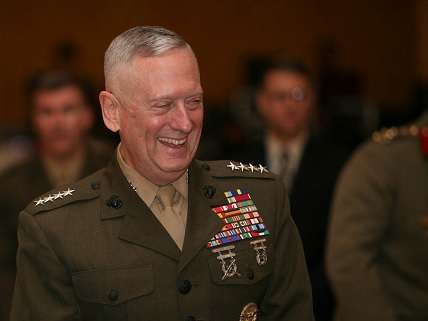Trump to Nominate Gen. James Mattis Secretary of Defense
Will need special permission from Congress because he only retired from the armed forces in 2013.

President-elect Donald Trump says he will nominate retired Gen. James Mattis as defense secretary, CNN and the AP report. Mattis retired from the Marines in May 2013, last serving as the head of U.S. Central Command, responsible for military operations in the wider Middle East, from Egypt to Kazakhstan.
Mattis served in the first Persian Gulf war, the Iraq war and the Afghanistan war, and was involved in developing the counter-insurgency strategy in Iraq. "They want us to become racist and to hate every Iraqi," Mattis told troops in 2007, according to a Los Angeles Times profile at the time. "You're going to be tested, and there are going to be some tough times."
"Every time you wave at an Iraqi civilian, Al Qaeda rolls over in its grave," he told them.
If Trump does nominate Mattis, the Congress would have to grant him an exemption—a 1947 law prohibits any former member of the military from serving as defense secretary who had not been retired for at least seven years. Only George Marshall, who served as defense secretary under Harry Truman from 1950 to 1951, after serving as secretary of state from 1947 to 1949, has previously received such an exemption.
Earlier this year, Mattis was floated as a potential independent presidential candidate. "It's been going on for 15 months. Since coming back from overseas, this is more of a foreign country than the places overseas," Mattis said, according to Military.com. "I don't understand it. It's like America has lost faith in rational thought."
Mattis was replaced at Central Command in 2013. He reportedly didn't get a phone call ahead of the announcement about his being replaced as head of Central Command, although a spokesman for the Pentagon said at the time Mattis was aware he would be replaced and by who. Mattis was believed to have been replaced because his views on the threat Iran pose didn't match the Obama administration's.
"Nothing I believe is as serious in the long term in enduring ramifications in terms of stability, and prosperity and some hope for a better future for the young people out there than Iran," Mattis argued earlier this year at the Center for Strategic and International Studies. "It remains the single most belligerent actor in the Middle East."
Nevertheless, he was not in favor of discarding the Iran nuclear deal. "We are going to have to recognize that we have an imperfect arms control agreement," he argued. "What we achieved was a nuclear pause, not a nuclear halt. We're going to have to plan for the worst."
Mattis was also a supporter of Secretary of State John Kerry's efforts at an Israeli-Palestinian peace process, saying Kerry was "focused like a laser beam" and that a two-state solution was a priority.
"I paid a military security price every day as the commander of CentCom because the Americans were seen as biased in support of Israel," Mattis said at a security forum in Aspen in 2013, shortly after retiring, "and that moderates all the moderate Arabs who want to be with us, because they can't come out publicly in support of people who don't show respect for the Arab Palestinians."
In 2010, Mattis was profiled in Slate for a series on risk-taking. He was described as an "evangelist for risk" driven by two principles:
The first is that intellectual risk-taking will save the military bureaucracy from itself. Only by rewarding nonconformist innovators will the services develop solutions that match the threats conceived by an enemy that always adapts. The second is that technology cannot eliminate, and sometimes can't even reduce, risk. Mattis warns about the limitations of sophisticated weapons and communications. They can be seductive, luring military planners into forgetting war's unpredictable and risky nature, leaving troops vulnerable.
An announcement about secretary of state may be made soon too—former U.S. ambassador to the U.N John Bolton meets with Trump tomorrow.
Meanwhile, the Obama administration is working hard to expand the executive branch's power to wage war around the world before handing the White House over to the Trump administration.


Show Comments (111)